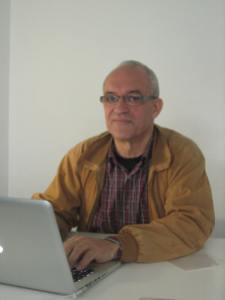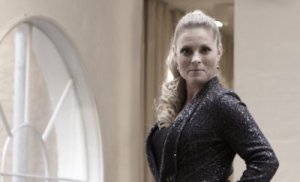25 years ago, Petr used to be an urban man studying computer science. Then he met Simona, and they decided to pursue their dream of freedom together. Choosing a traditional lifestyle of self-sufficiency, love and togetherness, the couple live in a self-made house in a meadow in the Bohemian Forest, with the bare essentials – and their nine children. Can fatherly love become suffocating for the children? Petr’s frugal, bohemian life choices mean sacrifices for the whole family. Will they be able to fit into modern society. Watch a clip of the movie here
I talked about that with the Czech director Eva Tomanová, whose feature-length documentary Always Together, selected for IDFA 2014 Competition for First Appearance.
What are you looking for in that story?
The truth! And I’m very aware of the kids, of course. Ten years ago, that’s when we met. The kids were much younger. And to me it looked like a little paradise in a way. Getting to know them made me realise how far from paradise their life really is.
The man has built his own kingdom in the middle of nowhere. Both parents are university educated. They have nine children that they don’t send to school. In the beginning you might feel this is like paradise, but then it starts to crack. The eldest daughter gets pregnant by a local farmer. The eldest boy ran away once. The other children can hardly speak. And there were even worse times. For example, for years they were forbidden to use any paper, even toilet paper. To learn the alphabet they used wooden sticks. I felt almost like a missionary because I brought them some stuff. I care about these children. I wanted to know them better. They have had such a different kind of education that I wonder how they fit into society.
Then there is the question of freedom. They are free from school and schedules, but confined to just one meadow. It’s also about him: how can a well-educated person become what he is. How can he make life so hard for his children? He believes the harder, the better. How come his wife is so obedient to him? Is it a crazy social experiment, or has he found some deep family values?
Did you get your answers?
I’m quite satisfied. I could not get more at the moment. But it’s not just about getting answers – it’s also about posing new ones. Which I hope I have done.

How do you feel about their bohemian lifestyle in the Bohemian Forest?
It is a very hard life. They gave up all the comfort we are used to. I have been to many places. I lived with rats in South America. I have visited the poorest parts of Africa doing a documentary about child labour and child trafficking. But then I always felt happy for simple things, such as having a bed of my own or a hot shower. They have never had this.


Is it a problem to lead a different kind of life than the majority, to rely on your own resources, rather than sacrificing your freedom to civilization?
You must be very strong and very convinced to do that. It is not easy. They are in a permanent struggle with authorities. The authorities wanted to take their children and put them into an orphanage. They have conflicts with the police; even Interpol was after them once!
A lot of people dream about choosing a traditional lifestyle of self-sufficiency, love and togetherness in order to live a frugal, bohemian life. How do we know whose lifestyle is the right one?
The countryside is a perfect place to live. It has a different pace, a different sense of time. But Petr decided to go many centuries back.
Follow this blog to read more.











